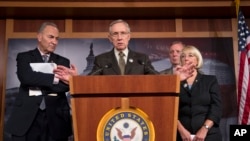Hopes to avoid a U.S. debt default and reopen the federal government are being pinned on talks between the Democratic and Republican leaders in the Senate. The leaders consulted Sunday but did not indicate a breakthrough is near.
Fiscal talks broke down Saturday between the White House and Republican leaders in the House of Representatives. Focus then turned to the Democratic-controlled Senate, where Majority Leader Harry Reid said no effort would be spared to find common ground with his Republican counterpart, Minority Leader Mitch McConnell. “It is important we do this. We must do this," he said.
Reid spoke during a rare Sunday Senate session that allowed members of both parties to come to the floor while consultations advanced behind closed doors.
Republican Senator Bob Corker sounded a hopeful note. “I am perfectly happy with the two leaders negotiating a deal. And I want to support the leaders in negotiating a deal," he said.
But the parameters, let alone the specifics, of any accord remain murky, and bipartisanship has all but disappeared from Congress. Saturday, Republican senators blocked a Democratic bill to raise America’s borrowing limit for more than a year, and Democrats rejected a Republican proposal that included short-term fixes to the debt limit and the federal shutdown.
Sunday, Senator Corker said fellow Republicans in the House of Representatives helped precipitate the fiscal impasse weeks ago by imposing conditions for funding the government and raising the U.S. debt ceiling. Corker called the tactic “an overreach”, and warned Democrats against making a similar error in current talks. Specifically, he urged Democrats to refrain from demanding an accord that eliminates the next round of automatic federal budget cuts that go into effect in January. “The Budget Control Act is settled law. And we have agreed to some [spending] caps," he said.
President Barack Obama has said he want to replace automatic, across-the-board spending cuts with targeted cost-saving measures, and is willing to engage with Republicans in far-reaching fiscal negotiations once the federal government reopens and the debt ceiling is lifted.
Majority Leader Reid echoed the call. “Americans want Congress to reopen the government, take the threat of default off the table, and sit down to talk about a long-term budget deal that creates jobs and strengthens the middle class. And I am confident and hopeful that will be accomplished," he said.
Senator McConnell did not come to the floor when the chamber gaveled in Sunday, nor did the Republican leader’s office give any indication of progress in discussions with Senator Reid.
Treasury officials say the U.S. government risks insolvency unless both houses of Congress vote to raise the debt limit by Thursday. And the ongoing government shutdown is believed to be shaving U.S. economic output a little more each day it drags on.
Fiscal talks broke down Saturday between the White House and Republican leaders in the House of Representatives. Focus then turned to the Democratic-controlled Senate, where Majority Leader Harry Reid said no effort would be spared to find common ground with his Republican counterpart, Minority Leader Mitch McConnell. “It is important we do this. We must do this," he said.
Reid spoke during a rare Sunday Senate session that allowed members of both parties to come to the floor while consultations advanced behind closed doors.
Republican Senator Bob Corker sounded a hopeful note. “I am perfectly happy with the two leaders negotiating a deal. And I want to support the leaders in negotiating a deal," he said.
But the parameters, let alone the specifics, of any accord remain murky, and bipartisanship has all but disappeared from Congress. Saturday, Republican senators blocked a Democratic bill to raise America’s borrowing limit for more than a year, and Democrats rejected a Republican proposal that included short-term fixes to the debt limit and the federal shutdown.
Sunday, Senator Corker said fellow Republicans in the House of Representatives helped precipitate the fiscal impasse weeks ago by imposing conditions for funding the government and raising the U.S. debt ceiling. Corker called the tactic “an overreach”, and warned Democrats against making a similar error in current talks. Specifically, he urged Democrats to refrain from demanding an accord that eliminates the next round of automatic federal budget cuts that go into effect in January. “The Budget Control Act is settled law. And we have agreed to some [spending] caps," he said.
President Barack Obama has said he want to replace automatic, across-the-board spending cuts with targeted cost-saving measures, and is willing to engage with Republicans in far-reaching fiscal negotiations once the federal government reopens and the debt ceiling is lifted.
Majority Leader Reid echoed the call. “Americans want Congress to reopen the government, take the threat of default off the table, and sit down to talk about a long-term budget deal that creates jobs and strengthens the middle class. And I am confident and hopeful that will be accomplished," he said.
Senator McConnell did not come to the floor when the chamber gaveled in Sunday, nor did the Republican leader’s office give any indication of progress in discussions with Senator Reid.
Treasury officials say the U.S. government risks insolvency unless both houses of Congress vote to raise the debt limit by Thursday. And the ongoing government shutdown is believed to be shaving U.S. economic output a little more each day it drags on.




